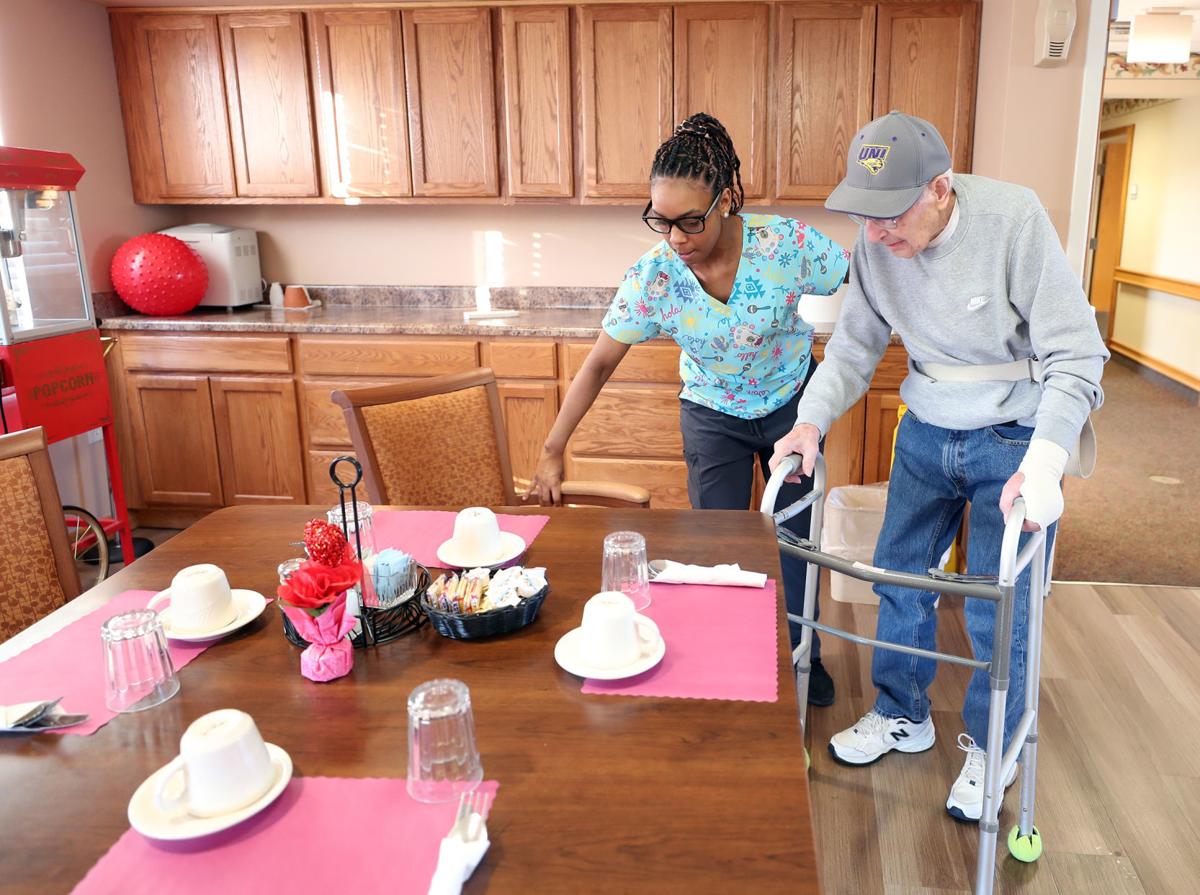‘Learn and earn’ pays dividends for participants in Hawkeye’s health care apprenticeships

WATERLOO – Typically, apprenticeships are reserved for the skilled trades such as carpentry, plumbing or electrical. These “learn and earn” programs combine classroom or online instruction with on-the-job training that earns participants a regular paycheck.
Hawkeye Community College has 108 business partners and 191 participants in its registered apprenticeship program, more than any other community college in Iowa. It is also the only Iowa community college to offer health care apprenticeships for certified nursing assistants and home health aides.
HCC is participating in Iowa Gov. Kim Reynold’s “Future Ready Iowa” initiative to build the state’s skilled workforce. The goal is to have 70% of Iowa’s workforce with an education or training beyond high school.
Alexis Berry, 26, recently completed level one in the CNA apprenticeship at Friendship Village. “I worked as a dietary aide for three or four years, and now I’ve started a career,” said Berry of Waterloo, a single mom with a 4-year-old daughter.
“I was offered an opportunity to participate in the apprenticeship program and said, ‘Yes, l’d love to join.’ I can work and earn a living while I’m taking classes, and my daughter can go to Friendship Village’s day care program while I’m at work.”
Berry is now a CNA, and in February began the second of three levels of training. She is one of three CNAs in Hawkeye’s partnership with Friendship Village. The program was developed to meet the needs of employers interested in a training program to fulfill the need for health care professionals.
Typically, the employer or registered apprenticeship sponsor pays for the cost of tuition or instruction, eliminating student loan debt for apprentices. In addition to learning and improving skills, as each level is successfully completed, apprentices see their wages rise.
“The program helps us by getting the health care staff we need. There is a nursing shortage and a CNA shortage — one feeds the other. A really good CNA is looking to be a nurse later on. In order for us to find talented, dedicated nurses, starting out as a CNA finds us people who want to help people,” said Sherry Turner, vice president of health services at Friendship Village.
“We’re on our maiden voyage with the program, which I think is a great idea that will catch on as other facilities like Friendship Village join in and see how it works,” she explained. “Nursing is such a rewarding career.
In addition to Berry, Emma Schaeffer and Rosalinda Rodriguez, both of Waterloo, are participating in the HCC-Friendship Village CNA apprenticeship at level two with an emphasis on hands-on skills.
“I took the CNA course right after high school and went to work at Friendship Village. Now I’m in this program, and I’m very excited. After my first class, I called my parents to tell them I’m loving every minute of it — more than getting my CNA,” said Schaeffer, who plans to become a nurse.
Rodriguez, who has been a CNA since 2017, said the program is valuable career development. She, too, is planning a future career in nursing. She praised the apprenticeship as “a good way to learn work skills and the skills you need for everyday life.”
The third level covers training and experience as a restorative aide, such as assisting FV residents with mobility and balance issues, for example, or as a medication aide. Medication aides are particularly valuable to a facility like Friendship Village, Turner said. “CMAs can help nurses pass basic medications – they can’t do narcotics or injections, but it frees up our nurses. Certification is gained at the end of level three.”
Knowledge and training are tested throughout each level of the apprenticeship. There also is a competency checklist, said Brenda Helmuth, health continuing education coordinator for business and community education at HCC. Each apprentice also has a mentor and support system at both HCC and Friendship Village. “It’s hard going back to school, and we are 100% behind these apprentices. We want them to succeed.”
“The apprentices also learn life skills that can be used in the workplace, but are useful outside their workplace, like CPR and first aid. It’s a different method of learning to help fill a nursing shortage. We help the apprentices live their lives upward,” Helmuth said.
So far, Berry gives the program an A+ and appreciates that training goes far beyond the classroom. “The hands-on training will be important, and it’s been very helpful to have a mentor, someone you can go to one-on-one and ask questions or get a little extra training on something,” she said.
2020 David Austin Roses and companion plants
